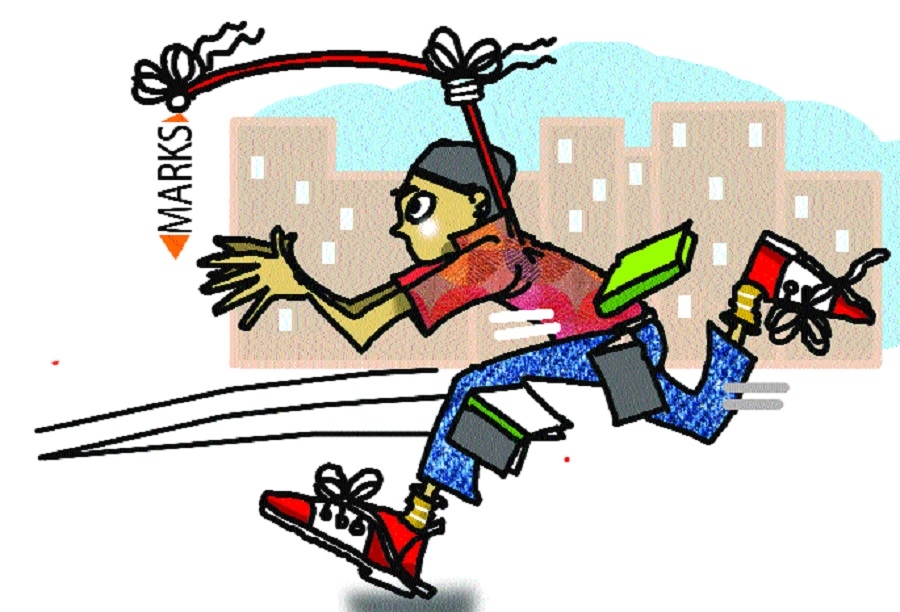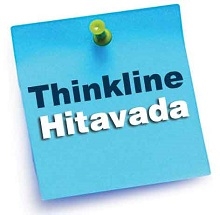Need for cent per cent introspection
| Date :29-May-2019 |

By Aasawari Shenolikar:
“Did you see the marks that the XII std students obtained, as also the class Xth?” was the first question that came out of the mouth of a retired school Principal after the preliminary greetings were exchanged. We had bumped into each other at the airport, and this dedicated teacher, who is passionate about the English language and its usage and still committed to teaching, was aghast at the number of students getting 100 percent marks in the Board examinations in languages and social studies. “If it’s a Science subject or Math where the responses are based on your analytical thinking and not rote learning and spewing them on the answer sheet, it's okay to be awarded 100 per cent marks. But languages?!”... she was very expressive in her displeasure.

What pains her more is that these very children (not all, but majority of them) aren’t able to speak a correct sentence in the Queen’s language and go on to score 100 on 100 in the written papers. This ‘doling out of marks liberally’ during the Board Examinations by the CBSE has set a flawed precedent because the State Boards are then under great pressure to ensure that their students don’t suffer. This gives rise to a vicious circle that continues year after year.
The Hitavada, through its ‘Loud Thinking’ column has been consistently commenting on this issues and the pros and cons of getting ‘high percentages’ and how the average student is getting adversely affected because of this. That is why, it becomes imperative that the educationists take a serious look at reforming the system so that it doesn’t focus on marks and grades alone, but lays stress on gaining knowledge and learning. The latest from the good offices of CBSE is that it will be taking a look at the curriculum and make changes so that the students are not stressed out, with specific emphasis on Math, which many consider a ‘killer subject.’
The circular of the National Curriculum Framework specifically mentions that there will be two levels of examinations catering to different classes of learners and the Board will allow different levels of testing so as to lessen the stress of exams in a child’s life. Initially the exams focused more on the subjective pattern, then the Board members introduced ‘more objective questions’ as they were of the opinion that more questions with internal choices will directly benefit the students. In the words of CBSE coordinator Jagdish Sharma, “Questions with internal choices will directly benefit the students. Their marks will improve. The problem of not being able to attempt the full paper will also be tackled as students will be able to choose questions.
Such a step by the board will benefit the students hundred per cent.” So this flip flop, of changing the patterns every couple of years has been continuing at the expense of the students. The respective Boards, even after so many years of discussion and deliberations have not been able to reach a middle point where the beneficiary is the student alone. When the Board authorities talk of ‘benefiting the students’ they are looking at the marks alone. Many, like the former principal, doubt whether they really want the child to be knowledgeable or stress upon 99 per cent grade in his marksheet and in reality they are not bothered if the child doesn’t have the capability to cope up with higher education later in life. “In objective tests, majority of the time, when a student chooses an answer, it is based on recognition rather than recall,” says the teacher, who has devoted more than 33 years of her life teaching students. Thus retention power needs to be tackled, rather than rote learning.
This is because learning doesn’t stop after the Board results are out. In fact, all the knowledge that you have gained during your school years comes into play after this when the students start appearing for competitive exams. This is when the analytical thinking comes into play because clearly the competitive exams are a class apart from your regular Board exams. And thus, this is when the wheat is separated from the chaff. It is unfair to dole out marks liberally to one and all, and club the weak and brilliant children together because the Board and the Schools cannot think beyond ‘marks.’ The schools want toppers, the parents want their wards to top and this can be achieved only if they get marks, more marks and more marks. Earlier it were only the science students who would score high marks. They had the advantage because of the practicals. With introduction of practicals in Humanities too, the bar of ‘not scoring great’ in Humanities has been broken and these students are now at a par with the science students as regards their grades.
“Not all children are rote learners,” says another ex Principal of an Army School. And it is these students who suffer because they are the ones who analyse the subject, think about what is being taught and then write what they perceive to be the best answers in their own language. But if the one who is checking the papers is unable to find the correct ‘words’ as provided by the guidelines, then the student who knows the subject thoroughly and has written the answer in his own words without including the ‘correct’ words will not score marks as opposed to the one who might have otherwise written gibberish but included all the correct words.
The focus has to be on analytical thinking and not reproducing ad verbatim from the books. Encouraging a child to think is the need of the hour. If a student asks questions, howsoever irrelevant they may sound at that time, he must not be scoffed at or discouraged from speaking his mind. Innovation in teaching methods so that it increases the retention power must be prioritised. And in the end, when you look beyond schools and marks and the various examinations, what you see is that in the world of jobs, the companies look, not for the one with a CGPA of 10, but someone who is well rounded and grounded and his personality, confidence and other attributes like emotional quotient, communication skills etc speak more than his marks.